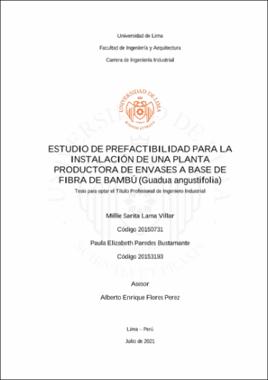Estudio de prefactibilidad para la instalación de una planta productora de envases a base de fibra de bambú (Guadua angustifolia)

View/
Lama-Paredes_Estudio-Prefactibilidad-instalación.pdf
(application/pdf: 3.489Mb)
(application/pdf: 3.489Mb)
Date
2021Advisor(s)
Metadata
Show full item recordAbstract
El trabajo presentado a continuación tiene como fin el estudio de prefactibilidad para
implementar una planta de producción tomatodos a base de fibra de bambú, esta surge a
base de la necesidad de preservar el medioambiente, mejorar el estilo de vida y generar
ahorro a largo plazo. El objetivo es evaluar la viabilidad, económica, técnica y financiera.
Para determinar la demanda del proyecto se analizó el mercado por medio de
fuentes primarias como encuestas; así como fuentes secundarias como investigaciones con
objetivos similares. Según la información recopilada se obtuvo que gran parte de la muestra
estaría interesada en los productos ofrecidos.
Además, por medio del método de Ranking de Factores se definió para la macro
localización de planta la ciudad de Lima, luego se evaluó la micro localización por el
mismo método, obteniendo mayor puntaje el distrito de Lurín, razón por la cual fue elegido
para ubicar la planta.
Asimismo, el tamaño de planta fue determinado por la relación tamaño-mercado
que es de 168,252 unidades al año; luego se usar el método de Guerchett y el Análisis
Matricial se estableció que el área total de la planta seria de 240m2, donde 147.88 m2 son
destinados al área de producción.
La empresa será constituida bajo el régimen tributario general como Sociedad de
Responsabilidad Limitada y estará compuesta por 8 operarios y 8 empleados
administrativos.
Finalmente, se calculó la inversión como un total de, 1,362,765 soles del cual el
40% será financiado por una entidad financiera y el resto como aporte de los accionistas.
Para el caso de la evaluación económica y financiera se obtuvo en ambos casos un VAN
mayor a 0, la tasa de retorno mayor al COK y un periodo de recupero financiero de 2 años
y 2 meses.
Se concluye la sostenibilidad y viabilidad del proyecto, como la entrega de
beneficios a los socios. De la misma manera, tendrá impacto social positivo, debido a la
generación de empleos para los pobladores de la zona. The present work proposes a study of perfectibility for the implementation of a plant
producing bamboo fiber containers and tableware, this arises from the need to preserve the
environment, improve the lifestyle, and generate savings in the long term. The objective is
to assess viability, economic, technical, and financial.
To determine the demand for the project, the market was analyzed through primary
sources such as focus group, surveys, as well as secondary sources such as research with
similar objectives. Based on the information collected, it was found that a large part of the
sample would be interested in the products offered and supermarkets were chosen as a
channel of sale to customers.
Moreover, by means of the Factor Ranking method was defined for the macro
location of the plant in the city of Lima, then the micro location was evaluated by the same
method, obtaining a higher score in the district of Lurin, which is why it was chosen to
locate the plant. For the production study the size of the plant was determined by the size market ratio which is 168,252 units per year; then the Guerchett method was used, and the
Matrix Analysis was established that the total area of the plant would be 450m2, where 240
m2 are intended for the production area.
The company will be incorporated under the general tax system as a Limited
Liability Company and will consist of 9 operators and 11 administrative employees.
Finally, the investment was calculated as a total of S/. 1,362,765, of which 40% will
be financed by a financial institution and the rest as shareholder support. In both cases, the
economic and financial evaluation obtained a VAN greater than 0, the rate of return greater
than the COK and an economic recovery period of 2 years and 3 months. It is concluded
that the project is sustainable and viable, will deliver benefits to the partners and will have
a positive social impact, as jobs will be generated for the population of the area.
How to cite
Lama Villar, M. S. y Paredes Bustamante, P. E. (2021). Estudio de prefactibilidad para la instalación de una planta productora de envases a base de fibra de bambú (Guadua angustifolia) [Tesis para optar el Título Profesional de Ingeniero Industrial, Universidad de Lima]. Repositorio institucional de la Universidad de Lima. https://hdl.handle.net/20.500.12724/14467Publisher
Universidad de LimaCollections
- Tesis [1167]
The following license files are associated with this item:

